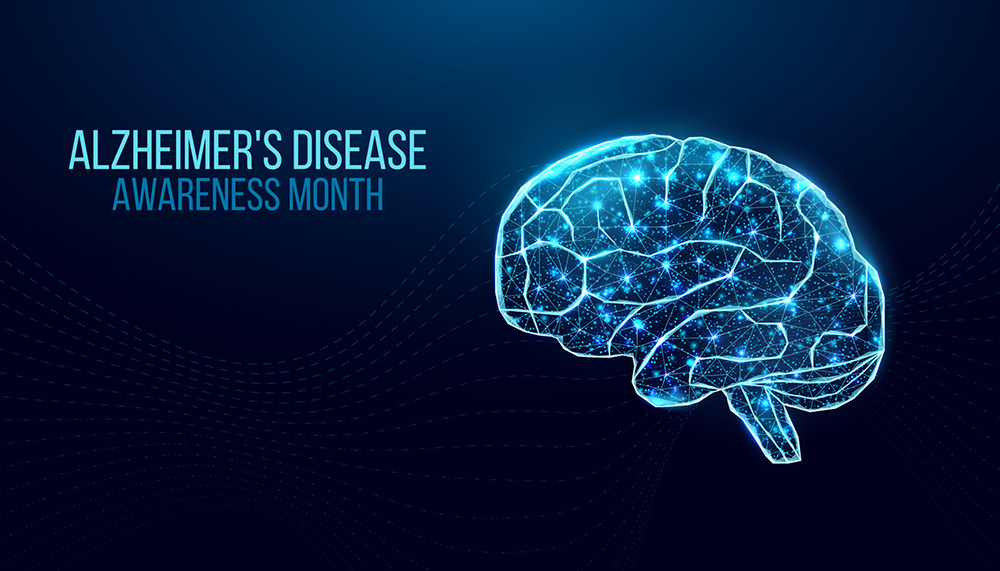Brenda Sawatzky,
Local Journalism Initiative Reporter
January is Alzheimer’s awareness month—but as prevalent as this disease has become in society, it is still poorly understood by most. For many, all that’s known is that it’s a progressive and incurable terminal disease affecting a person’s memory.
Another well-known fact: it can have a profound effect on family members and caregivers.
Alzheimer’s is a cruel and unforgiving disease which causes changes in a person’s personality. Sufferers may experience long-term and short-term memory loss, even to the point of not recognizing loved ones. They may experience confusion and disorientation, changes in mood and behaviour, anger, and delusions.
According to the Alzheimer’s Society of Manitoba (ASM), more than 20,000 Manitobans are currently diagnosed with either Alzheimer’s or another type of dementia. By 2050, they tell us, that number will have virtually doubled.
In 2025, approximately 3,600 Manitobans are expected to develop the disease.
Apart from memory loss, there are other early symptoms. For example, sufferers may struggle to perform day-to-day tasks or fumble for the right words to complete a simple sentence. They may demonstrate poor judgment or problems with abstract thinking. They are quite likely to regularly misplace things like keys or a wallet.
The ASM was founded as a non-profit 40 years ago to provide family and caregivers with a wealth of educational and emotional support when dealing with dementia, of which Alzheimer’s is the most prevalent form. ASM also provides research funding and awareness about reducing one’s risk of contracting the disease.
Living Hell
Sheri Mahara and her husband are residents of Niverville. Two years ago, they moved Sheri’s mother to the Niverville Credit Union Manor after years of struggling against the effects of Alzheimer’s. Mahara describes that struggle as “a living hell.”
There was no family history of Alzheimer’s, which is why it took Mahara by complete surprise when her mother began to display symptoms.
Mahara’s mother was in her seventies at the time, a widow living on her own in a Winnipeg apartment. Until the COVID-19 pandemic, she still worked as a part-time salesperson at a Nygard International clothing store.
“A money problem came to my attention that made me realize that something was very wrong,” Mahara says.
The first clue was when her mother’s phone went dead in December 2019.
“She said there was something wrong with the phone, but it turned out that she wasn’t paying the bill,” Mahara says. “She didn’t even know that she wasn’t paying the bill. As I dug into it, I saw that there had been something wrong with her for a lot longer than I’d realized.”
Mahara also discovered that her mother was dangerously close to being evicted for her failure to pay rent. A quick assessment of her mother’s bank statements indicated that the financial problems had been compounding for quite some time.
“Her chequing account was so far into overdraft,” Mahara says. “It was obvious that she’d been going to a bank machine and taking out $20—and if it gave her the money, she took out another $20, not having any wherewithal to consider that rent was due in five days.”
Her credit card debt had also been growing and collection agencies were making monthly withdrawals from her mother’s bank account. Presumably, they’d gotten her mother’s approval at some point to do this.
“This monthly [debt collection] payment plus her rent added up to more money than she made,” Mahara says. “It was a completely impossible [situation].”
Mahara began to question the underlying financial system that didn’t seem to be set up to recognize these red flags of an aging client with lifelong good credit suddenly running into massive and unexplained debt.
To Mahara, it felt like things couldn’t get much worse.
Until they did.
Her mother ended up losing her job when the Nygard stores were forced to close due to bankruptcy. At the same time, Manitoba fell into the first waves of the pandemic. The situation further deteriorated when it became difficult to secure in-person access to banks and medical clinics.
Mahara’s first move was to see a lawyer in order to become her mother’s legal power of attorney. Thankfully, her mother was having a good day in terms of cognitive clarity and was able to convince the lawyer that she was competent enough to make that decision. Had it been otherwise, Mahara would have had to jump through major hoops.
She closed her mother’s bank account and instantly began fielding daily harassment calls from collection agencies.
“I had her phone number changed, because I’m sure she must have been bombarded by them too,” Mahara says. “I couldn’t risk her saying or telling them something [they shouldn’t know].”
The next move was to get a medical diagnosis.
“She couldn’t remember who her doctor was even though I know she had one,” Mahara says, since the memory loss was compounding very fast.
This, too, proved more difficult than expected.
“I had a very difficult time finding a doctor who believed me,” Mahara says. “My mother was a master of hiding [her symptoms]. She would say to the doctor, ‘I don’t know what’s wrong with Sheri because there’s nothing wrong with me.’”
Through a friend of a friend, Mahara was finally led to a geriatric health nurse who was able to open some doors. This led to a new doctor, an MRI, and an Alzheimer’s confirmation.
With a diagnosis in place, Mahara reached out to the ASM, who provided help by way of resources and group support.
She soon met with more roadblocks, though, when obtaining homecare through the WRHA proved difficult due to lack of staffing. The homecare she did get regularly cancelled, requiring Mahara to run to Winnipeg to assist her mother.
The situation came to a head when Mahara’s mother began getting lost in the hallways of her apartment building. Mahara discovered this problem when she received a phone call one day from her mother’s grocery delivery person, who was unable to leave the order with no one home to accept it.
In 2022, Mahara moved her mother to the assisted living facility in Niverville. With only her mother’s meagre pension, the move required Mahara and her husband to subsidize the cost.
It was the first time, though, that Mahara truly breathed a sigh of relief, knowing that her mother was finally safe and in good hands.
Her mother’s disease continues to cripple. She now experiences seizures which cause her to fall but not lose consciousness. She’s been transitioned to the supportive living floor and now awaits a transfer to the personal care home.
“For me, my mother really died several years ago, and I grieved it then,” says Mahara. “It’s a weird sort of place to be, but I don’t know if I’ll even go through a grieving process once she passes.”
Through the experiences of the past four years, Mahara has one primary piece of advice for those entering similar circumstances.
“Do not delay in getting them to a doctor and getting a diagnosis,” Mahara says. “You have to take authority, put your foot down, and say, ‘We are doing this!’”
Inevitable Decline
Another Niverville resident, Cameron Rennie, lost his mother to Alzheimer’s on December 15, 2024. She was 80 years of age.
Rennie says that he started to see signs of cognitive dysfunction in his mother, Norma, tens years earlier, before his own father recognized it. It began with Norma’s repetitive storytelling and questioning.
His father soon acknowledged it, too, when Norma became lost while driving and had to call for help.
In this family’s case, it came as no real surprise. Alzheimer’s ran in Norma’s family. She’d cared for her own mother through the course of the disease.
The family convinced her to go for testing.
“There is a geriatric mental health assessment that goes beyond that of daily living,” Rennie says. “There are a few key tests that they do.”
One of those tests challenges the patient to draw the face of a clock. While it sounds like a simple task, it is not simple for an Alzheimer’s patient.
“Sometimes the hands [of the clock] don’t end up in the right spot,” Rennie says. “Sometimes they’re outside of the circle. Sometimes the numbers are out of order. It’s remarkable, but it’s still one of the best tests you can do for an initial non-medical test.”
Tests like these, along with an MRI, confirmed the diagnosis. Still, it wasn’t easy for Norma to accept her inevitable fate.
“Patients that go through Alzheimer’s will typically reach a level of frustration with it, where they’re still trying to cover it up and make themselves seem normal,” Rennie says. “That can result in a lot of anger and, sadly, Dad had to deal with that.”
These outbursts of anger and continual repetition of questions bore down on Norma’s husband. He finally reached a point of exhaustion and caregiver burnout. Eventually he agreed to move Norma to Rosewood Supportive Housing, a decision marked with both guilt and relief.
Immediately, they saw further regression in Norma’s condition.
“Any significant disruption to a dementia patient’s life will lead to another phase of rapid decline,” Rennie says.
At one point, it was agreed that Norma would be administered a drug shown to have positive effects for some Alzheimer’s patients.
“In Mom’s case, I would say her decline more or less plateaued for two to three years,” says Rennie. “It by no means reversed it, but to see Mom not declining was incredible.”
Unfortunately, her condition plummeted once again. Norma no longer recognized Rennie, his brother, or her grandchildren when they visited. Even so, they never stopped paying her visits.
“Mom was the most caring individual you can imagine,” Rennie says. “She cared for us and we cared for her until the last day. We still made birthdays and Mother’s Day as special as we possibly could for her.”
To help stimulate her memory, they ensured that family photos filled her room and she had constant access to the music she loved.
“Music and visual imagery do incredible things for dementia care patients,” says Rennie.
Still, she had good days and bad days. The disease continued to evolve in different ways.
“There’s quite commonly a period when dreams can be very lucid and the brain loses the ability to determine if that was real life or a dream,” Rennie says.
At times, Norma’s response to these lucid dreams was to lash out at loved ones, believing they’d done the terrible things that she’d earlier dreamt about.
In November of last year, Norma was admitted to the hospital for palliative care. In the first two weeks, she suffered terribly. For Rennie and his family, it was difficult to witness.
In desperation, Rennie began to research Medical Assistance in Dying (MAiD), but by Canadian law a patient must be of sound mind to choose this option.
“Why in the world, if somebody is clearly end-stage dementia, could her power of attorney not elect [to end it],” Rennie says. “I hate to say it—in fact, it makes me nauseous—but at that point, it’s no way to live.”
Two weeks before she died, Norma was put on comfort care, ensuring that her pain was alleviated. But no further interventions were made. She was given no food or water to unnecessarily sustain her life.
Ironically, it was during this state of deprivation that Rennie says his mother’s cognitive function suddenly improved.
Rennie cites some recent research that likens Alzheimer’s to type-3 diabetes.
“They’ve started to see some interesting results with fasting,” he says. “I’m sure that Mom knew who all of us were in the room at the end and that gave me such comfort.”
In the aftermath of his family’s experience, Rennie has one bit of advice to offer others: lean heavily on the support provided by ASM.
ASM Support
Sierra Dueck is the South Eastman Regional Coordinator for the ASM. Her office is located at the Pat Porter Active Living Centre in Steinbach.
Dueck’s role is to create Alzheimer’s awareness through educational workshops and to connect locals with supports and resources.
“We have a first-link referral system, so we get referrals from Southern Health, doctors, and others,” Dueck says. “We reach out to clients and offer one-to-one check-ins and support. That could look like me just being a listening ear. We know that dementia diagnosis can be very overwhelming for families. We can offer guidance on how to go forward after a diagnosis.”
Dueck also organizes the Minds in Motion program, which provides gentle chair fitness and socializing and stimulating activities for dementia patients and their caregivers.
“Anything that’s good for your heart is also going to be good for your brain,” Dueck says. “That’s sort of the slogan we use when it comes to Alzheimer’s.”
In terms of prevention, Dueck says that hearing loss is believed to put people at higher risk for dementia.
“When people have hearing loss, their brain doesn’t have to process that information because it’s not coming in,” Dueck says. “So we always suggest to get that checked and get those hearing aids to allow your brain to continue working through that stimuli.”
Along with exercise, cognitive stimulation, and healthy eating, there are other things the ASM recommends to prevent or slow the progression of the disease. These include lifestyle changes or medication as well as music, dance, and pet or aroma therapy.
“My heart is to let people know that they’re not alone,” Dueck says. “Sixty-two percent of Manitobans have had a close family member or friend living with the disease. Plus, the more we share with one another, the less stigma there is attached to it.”
Brenda Sawatzky,
Local Journalism Initiative Reporter
The Niverville Citizen


